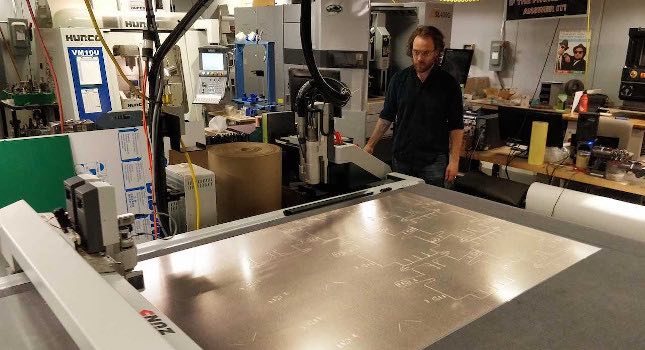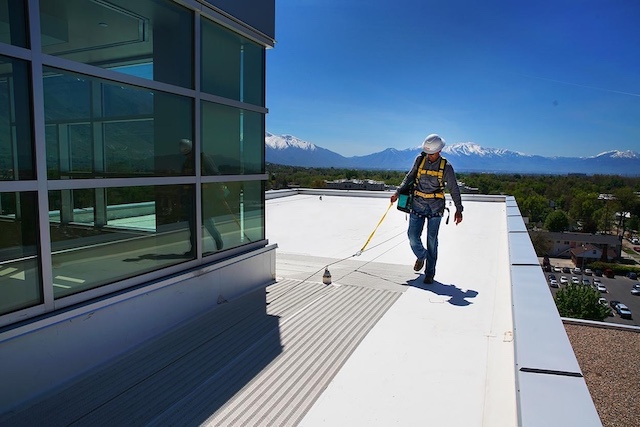An MIT team launched mass manufacturing of a new technique to meet the high demand for disposable face shields with a single-piece design that uses die cutting to create them quickly.

A team from MIT launched mass manufacturing of a new technique to meet the high demand for disposable face shields. The shortage of personal protective equipment (PPE) available to healthcare professionals has become increasingly problematic as COVID-19 cases continue to surge. The sheer volume of PPE needed to keep both doctors and their patients safe in this current crisis is daunting – for example tens of millions of disposable face shields will be needed nationwide each month.
The single-piece face shield design will be made using a process known as die cutting. Machines will cut the design from thousands of flat sheets per hour. Once boxes of these flat sheets arrive at hospitals, healthcare professionals can quickly fold them into three dimensional face shields before adjusting for proper face.
“These face shields have to be made rapidly and at low cost because they need to be disposable,” said Martin Culpepper, professor of mechanical engineering, director of Project Manus, and a member of MIT’s governance team on manufacturing opportunities for COVID-19. “Our technique combines low cost materials with a high-rate manufacturing process that has the potential of meeting the need for face shields nationwide.”
Culpepper and his team at Project Manus spearheaded the development of the technique in collaboration with a number of partners from MIT, local-area hospitals, and industry. The team has been working closely with the MIT Medical Outreach and the Crisis Management Unit established by Vice President for Research Maria Zuber and directed by Professor Elazer R. Edelman.
Initial fabrication of the shields will be done by Polymershapes, based in Boston, Massachusetts with plans to expand across the country through fifty-five additional Polymershapes locations.
Extending the life of face masks
When used correctly, face masks should be changed every time a doctor or nurse treats a new patient. However, over the past month many healthcare professionals have been asked to wear one face mask per day. That one mask could carry virus particles on them – potentially contributing to the spread of COVID-19 within hospitals and endangering healthcare professionals.
“The lack of adequate protective equipment or the idea of reusing potentially contaminated equipment is especially frightening to healthcare workers who are putting their lives, and by extension the lives and well-being of their families, on the line every day,” said Edelman, Director of MIT’s Institute for Medical Engineering and Science, Edward J. Poitras Professor in Medical Engineering and Science, and leader of MIT’s PPE task force that Culpepper serves on.
Face shields can address this problem by providing another device for protection covering the entire face, adding a layer of protection the covers masks and more while extending the life of face masks and respirators. The shields are made of clear materials and have a shape similar to a welder mask. They protect the healthcare professional and their face mask from coming in direct contact with virus particles spread through coughing or sneezing.
The face shield provides health care workers with full coverage around the forehead, neck, and sides of the face. Courtesy: Project Manus, MIT[/caption]
“It’s been a pleasure in this difficult time collaborating with such an impressive group, drawing on all of the Institute’s strengths to quickly define and refine a solution to an urgent need,” Gershenfeld said. “The work at MIT will be valuable beyond its immediate local impact, as a best-practices reference for the many other face shield projects emerging around the world.”
Testing the shield at local hospitals
With a number of working prototypes built, Culpepper and his team moved to the testing phase after consultation with, and practical feedback from, Edelman, who is a physician himself.
“The single greatest insecurity of a healthcare provider is the thought that we will become infected and in doing so be unable to perform our duties or infect others,” Edelman said.
Edelman demonstrated how to store, assemble, and use the face shields to nurses and physicians at a number of local-area hospitals. Participants were then asked to use them in real-life situations and provide feedback using a one-page survey.
The feedback was positive – participants found that in addition to being easy to assemble and use, the MIT-designed shields provided good protection against coming in contact with virus particles through splashes or aerosolized particles.
Armed with this feedback, Culpepper’s team made a few minor adjustments to the design to maximize coverage around the sides and neck of users. With the design finalized, the project has this week shifted to high-rate mass manufacturing.
High-rate mass manufacturing
Fabrication company Polymershapes is starting mass production of the face shields. The die cutter machines used in mass manufacturing will produce the flat face shields at a rate of 50,000 shields per day in a few weeks. The manufacturer will continue to ramp up and increase the rate of manufacturing further with the ability to fabricate in more than eighty facilities nationwide.
“This process has been designed in such a way that there is the potential to ramp up to millions of face shields produced per day,” Culpepper said. “This could very quickly become a nationwide solution for face shield shortages.”
MIT plans on purchasing the first 40,000 face shields to donate to local Boston-area hospitals this week and Polymershapes will donate 60,000.
“Having an adequate and perhaps even endless supply of PPE is absolutely critical to ensuring the safety of the entire population, especially those who care for COVID-19 patients,” Edelman said.
Throughout the process, Culpepper’s team received help from a number of colleagues and departments across MIT. This includes MIT’s Office of the Vice President for Research, Professor Elazer Edelman, Tolga Durak, Managing Director, MIT Environment, Health & Safety Office, The Center for Bits and Atoms, MIT Procurement Operations, MIT’s Office of the General Counsel, MIT’s Department of Mechanical Engineering, and colleagues from MIT Lincoln Laboratory who helped source material to build the face shields and supported design iterations. They also received advice from MIT colleagues working with the Massachusetts Technology Collaborative, which is helping organize manufacturers to respond to Covid-19 needs.
“This project was a great example of collaboration across MIT and the employment of mind-heart-hand. When we reached out to others, they dropped everything to put their minds and hands to work helping us make this happen quickly,” Culpepper said. “It is also a great example for others to look to safely and rapidly innovate PPE for COVID-19.”



